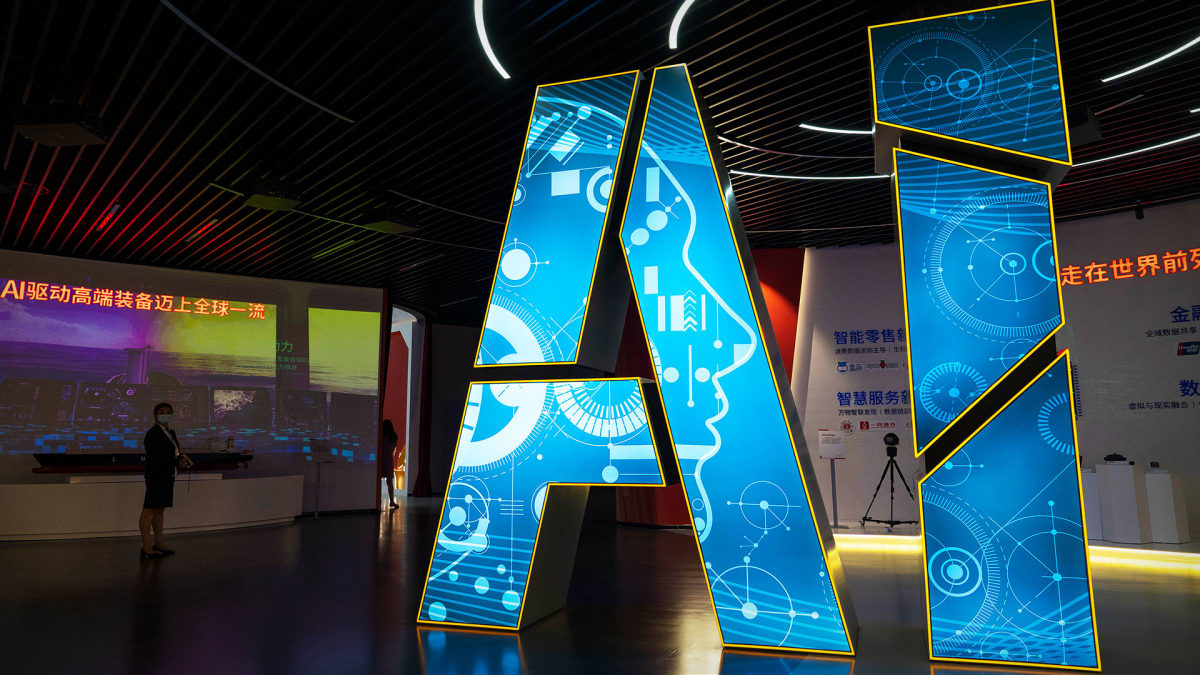
Artificial Intelligence is starting to have a significant impact on U.S. companies as the technology, which seemed to enter the market's consciousness only earlier this year, accelerates its relentless advance.
AI, as it's more commonly known, uses a combination of algorithms that access large language models and datasets that enable it to mimic human intelligence and decision-making.
ChatGPT, an AI-powered search tool developed by OpenAI and recently embedded into Microsoft's (MSFT) Bing, is the most well-known, although Alphabet's Google, (GOOGL) Yahoo (APO) and China's Baidu (BIDU) have all harnessed AI techniques to enhance their search platforms.
The adoption of AI, however, is now moving quickly beyond online search and into broader sections of the global economy, raising concern about the pace of its advance and its impact on jobs and growth over the coming years.
Nvidia CEO Huang: Inflection Point for AI
Nvidia (NVDA) CEO Jensen Huang, in fact, has outed the potential of the $600 billion market for AI chips amid what the company called an "inflection point" for the world's fastest-developing technology.
Nvidia earlier this year unveiled a new AI supercomputer, known as Nvidia DGX, that enables business customers to access AI-related technology through cloud-computing providers such as Microsoft and Oracle (ORCL). The move essentially creates a new market for AI-as-a-service to thousands of companies worldwide.
That ability to address the new AI investment explosion, sparked in part by the unveiling of the ChatGPT chatbot earlier this year, could put Nvidia in a leadership position within a market that could be valued at more than $600 billion, Huang told investors in late February.
Gartner, the management consultancy group, predicts so-called generative AI will account for around 10% of all data produced by the year 2025, up from just 1% in 2021. Analysts at KGI see this as adding between $5 billion and $6 billion to Nvidia's top-line revenue within the next three years.
Chegg Feels the Impact of AI
Chegg (CHGG), the U.S. educational-technology company that specializes in online textbooks, tutoring and other academic services, warned late Monday that it's observed a "significant spike in student interest in ChatGPT" That's already "having an impact on our new customer growth rate," the company said.
As a result the group forecast weaker-than-expected second-quarter revenue of between $175 million and $178 million, and investors hammered the stock in premarket trading. The concern is that students will lean on free-to-use ChatGPT over paid-for services such as online tutoring and text books.
The company put on a brave face, with CEO Dan Rosensweig telling investors that Chegg is in the "best position to take advantage of the advancements in AI for the benefit of students."
But its shares were last seen 45.6% lower in early Tuesday trading and changing hands at $9.58 each, while shares of larger education rival Pearson (PSO) slumped 12% to $9.64 each, a move that would mark their biggest single-day decline since October of 2021.
International Business Machines (IBM) CEO Arvind Krishna, meanwhile, suggested late Monday that the tech group is planning to pause hiring in some of its automated functions, with the aim of ultimately replacing thousands of jobs with AI technology over the coming years.
Krishna told Bloomberg Television said he would slow hiring in human resources and certain back-office areas of the tech group, adding that around a third of the group's 26,000 non-customer facing roles could be "easily" replaced by AI and automation over the next five years.
AI: Troubling Portent for Companies, Legislators
That could prove troubling from both an employment and policy perspective, given that IBM last year lobbied Congress hard to accelerate the passage of the Creating Helpful Incentives to Produce Semiconductors, or CHIPS, Act. The law earmarked $52 billion in taxpayer support to help develop an American-based chip-supply chain.
Senate Majority Leader Chuck Schumer, who called AI "one of the fastest moving, and most consequential industries across the globe," said last month he's working on a new regulatory regime for AI. That framework would "prevent potentially catastrophic damage to our country while simultaneously making sure the U.S. advances and leads in this transformative technology," the New York Democrat said.
AI's rapid adoption, alongside the ethical and economic concerns that it raises, prompted a statement earlier this week from the G-7.
Ministers responsible for digital economies meeting in Takasaki, Japan, last weekend said that while AI technology should be allowed an "open and enabling environment," it needed a "risk-based" approach to rule and regulations that would ultimately ensure a "trustworthy" system.
"We plan to convene future G7 discussions on generative AI which could include topics such as governance, how to safeguard intellectual property rights including copyright, promote transparency, address disinformation" including information manipulation by foreign forces," the G-7 statement said.
Get exclusive access to portfolio managers and their proven investing strategies with Real Money Pro. Get started now.







